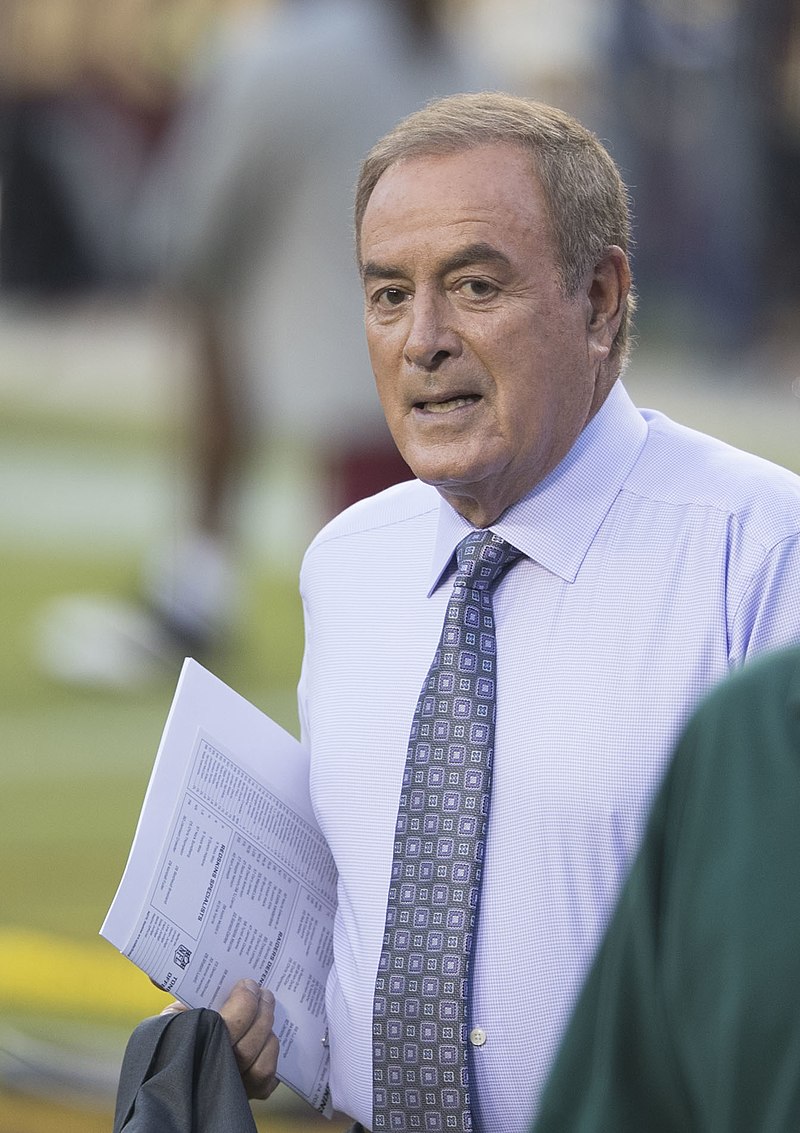Entertainment
NBC’s Al Michaels prepares for 10th Super Bowl broadcast

Al Michaels beim Spiel der Washington Redskins gegen die Los Angeles Raiders im September 2017. (Photo By Keith Allison from Hanover, MD, USA – Al Michaels, CC BY-SA 2.0)
Al Michaels has a similar level of anticipation heading into his 10th Super Bowl broadcast as he had the first time he worked the biggest stage on television 30 years ago.
Michaels is set to join Pat Summerall as the only play-by-play announcers to call at least 10 Super Bowls when he works next weekend’s game in Minneapolis between New England and Philadelphia.
“It’s every bit as exciting and even more so in a way,” Michaels said in a phone interview. “As you get older and you get the opportunities to do these events, you probably savour it more.
“When I look at guys like Tom Brady and Drew Brees, as they get older, I think they begin to appreciate and savour the opportunities more because you’re closer to the end than you are to the beginning and you never know how many more you have left.”
The 73-year-old Michaels is in no hurry to give up the microphone on NBC’s “Sunday Night Football” broadcast, which is on target to be television’s highest-rated show for a record seventh straight year, passing the mark set by “American Idol.”
With a comfort level with his broadcast team led by executive producer Fred Gaudelli, director Drew Esocoff and analyst Cris Collinsworth, Michaels is having as much fun as he ever had since becoming the lead announcer for ABC’s “Monday Night Football” in 1986.
Michaels points to advice from former Buffalo coach Marv Levy about never considering retirement. He could be in position to stay long enough to match Summerall’s record of 11 Super Bowl play-by-play broadcasts.
“If you think about retiring, you’ve already retired,” Michaels said. “That rings in my ears. I have a great amount of passion for what I do. I love what I do. I work with the greatest people I’ve ever worked with in this business top to bottom. I still get excited going to the games. I love walking into a stadium. I love sports.”
It’s been a remarkable career for Michaels, who has called eight World Series, including the Earthquake Series in 1989; nine Olympics, including the “Miracle on Ice” in 1980; and now is preparing for his 10th Super Bowl.
He still remains at the top of his game in his sixth decade of work.
“Working with Al has been a professional highlight and all-out blast,” said Gaudelli, who will work his sixth Super Bowl with Michaels next week.
“I’ve been watching sports all my life and in my opinion no one can capture the moment quite like Al can. It’s never rehearsed or predetermined he sees it, calls it and somehow the words are perfect. He never ceases to amaze me.”
Michaels’ first Super Bowl came in 1987 when Doug Williams led Washington to a 42-10 victory. Several of his others have included some of the most dramatic finishes in Super Bowl history, from Scott Norwood’s missed field goal for Buffalo in 1991, to Mike Jones’ tackle of Kevin Dyson at the 1-yard line on the final play to preserve St. Louis’ title in 2000, to Eli Manning’s second comeback drive to beat Tom Brady six years ago.
But two stand out the most. The first was in 2009, when Pittsburgh’s James Harrison returned an interception 100 yards for a score on the final play of the first half, and then Santonio Holmes caught the winning TD for the Steelers in the final minute of a comeback win over Arizona.
Then in the most-watched television event in U.S. history three years ago, the Patriots won their fourth title when Malcolm Butler intercepted a pass from Russell Wilson at the goal line when it looked as if the Seahawks were poised to score the go-ahead TD in the closing seconds.
Those are the moments no broadcaster can ever prepare for, and only the most accomplished can handle as adroitly as Michaels has over the years.
“John Madden once had a great line. We prepare like crazy. We prepare for any eventuality. But you get to the booth, and as John would say, all of a sudden a game breaks out,” Michaels said.
“The game has to come to you. You can’t go to the game. We have a million things we can talk about, but if you start talking about them and they’re not germane to the game, the listener will find that cacophonous. You have to blend what you know with what’s going on in the game.”
One aspect Michaels didn’t have to deal with for most of his career but has risen up this season has been social justice protests during the national anthem. He realizes it’s a delicate balance for an announcer because many fans will be offended by networks showing or talking about the protests, while others will be equally as upset if they are ignored.
While no Eagles or Patriots are currently protesting, Michaels is prepared for any scenario.
“We’re there to report what happens,” he said. “If there is something that does take place, you have to cover it. You don’t have to editorialize about it. You report here is what happened and you don’t lecture people on this is bad or this is good. People tune in to watch the game and we’ll bring them the game.”





















